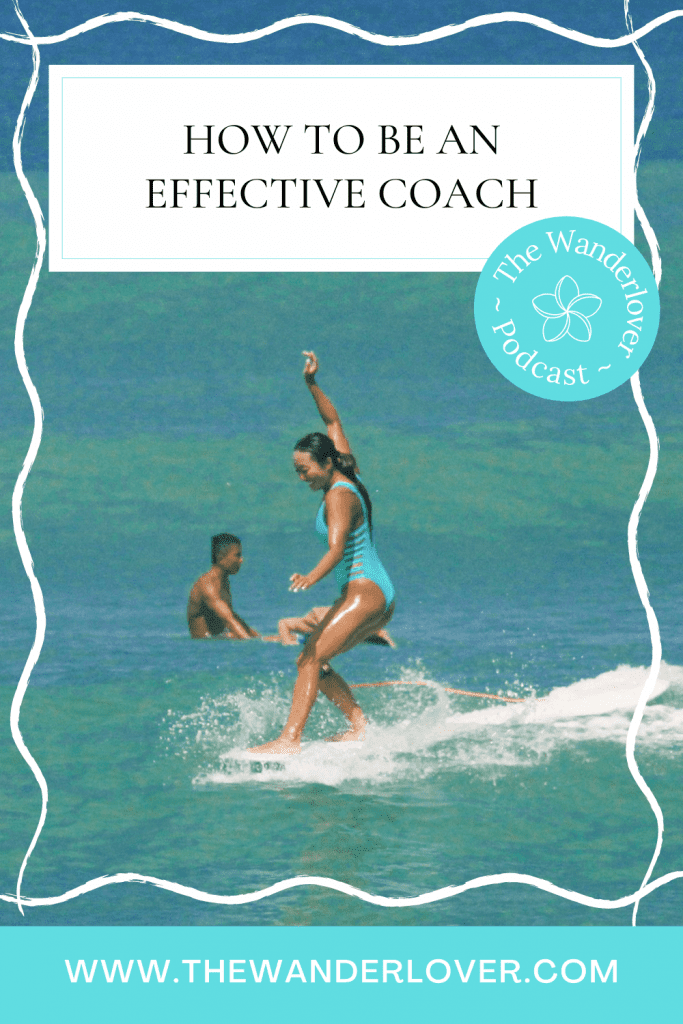This week we look at my 5 tips to being an effective coach (4:30) and how to TEACH your clients the key to success rather than simply showing them (13:00).
Quick Links
✧ Join The Wanderlover Coaching Group
✧ Download Your FREE 0 to $100K Game Plan
Audio Transcript
(0s):
The Wanderlover podcast was created with a mission to enable travel and freedom through entrepreneurship. I’m your host, Danielle Hu business mentor, content creator, and founder of the wander lover tune in every week for episodes about travel online business, social media, and mindset that will inspire you to take massive action towards living the life of your dreams. Hi everyone. Welcome back to the wanderlust podcast.
(39s):
Just a heads up there is construction going on right next to our Villa. Right now I’m recording inside. You might hear some banging occasionally if that’s the case, just ignore it. It’s not the best recording setup I have right now, but it will do. It’s still going to have an amazing podcast episode. And this is also a reminder that there are things you can’t control in life, and you just have to move forward. I was stressing for a little because I was like, should I go to the coworking space? I record somewhere else. And then ultimately decided that it wasn’t worth my time. And you guys probably don’t mind.
(1m 20s):
So there’s banging in the back once in a while, also a little life update and a little lesson on just surrendering to what life throws at you. You guys have seen the Villa that rags and I are staying and right. It’s beautiful. It’s right by the beach, it has the perfect amount of rooms. It has a giant garden, a pole, honestly, the best place I’ve lived in Bali so far. Well, the owners from Germany told us that they will be returning to Bali at the end of the month. So we need to move out. Originally when we paid for two months upfront, we had the understanding that they would be staying in Germany longer and we would have the option to extend, but they told us that they’re coming back.
(2m 6s):
So we have to move out and Ragz and I have been looking for new villas. First of all, when I first heard the news, I was devastated because I was just so in love with our space. And I didn’t want to be moving again, but there are things you can’t control. And I could have just spent days and days sulking about it and not taking action. But then I had a change of heart and I was like, you know what? There are bigger and better things coming. And lo and behold, we have this amazing opportunity to go live for a month on another island called Rote island That Ragz traveled to once has amazing surf.
(2m 50s):
And it just looks like absolute paradise. And we have an offer to stay there for a month. And I think it’s not confirmed yet, but I think we are going, I will update you guys once we book flights, but it’s just so magical. How at the beginning of the month, it’s not something we would have ever considered and had we had a longer-term place. We probably wouldn’t have taken up this offer. And so the alignment of so many events, it’s just a sign that when you lean into your intuition and just go with the flow and let it all go, like not try to control every single event and the outcome, amazing opportunities are always presented to you.
(3m 34s):
So this week’s episode is how to be an effective coach. And I know there are a lot of coaches and coaches to be listening to this podcast episode. I always get a bunch of questions on how do you work with your clients? Like, what is your coaching style? What tips do you have for a new coach, just starting out. And we have a few momentum mastermind members starting their coaching business. And so this is just going to be such a valuable lesson. When we think of coaching, I know the first thing that pops into everyone’s mind is reaching a goal and seeing results. So although that is, of course the overall goal of being an effective coach, I’m actually going to give five tips, not related to just being so pigeonholed to the goal and how to develop a relationship with your clients.
(4m 32s):
So that over time they will inevitably reach the goal of themselves. And they don’t necessarily know to be depending on you. So the first tip that I have to be an effective coach is to set the example. So, you know, need to be walking the talk, you need to be practicing what you preach. And there are so many coaches in this day and age that will advise one thing, but then operate another. And to me, yeah, it just feels so unaligned. When someone does this, it’s basically like hiring a fitness coach that tells you how to work out and what to eat, but then their habits say, otherwise they’ll like binge on junk food or binge on Netflix and skip workouts.
(5m 18s):
It’s not an effective way to be coaching. If you can’t even prove that it’s an effective method yourself. And if, for example, you offer a business coaching program that could hypothetically work, but you’re not following your own program. You have to ask yourself why that is like, do I need more accountability? And this, what can you do? So that the way you teach is proven, and you are a testimonial to your own program and to go, okay, off of this, you may be listening. And you’re like, yes, my clients can do exactly what I do. And they can get the results. I’m doing the inner work.
(5m 59s):
I have the work ethic and my clients can do the same. Well, my question for you now is do your clients know that you’re doing the work? Does your audience know everything that’s going on? Fueling your mind, feeling your body, feeling your soul. Do they know that? Are you posting it online? Is there somewhere online that they can be learning about you and following along, right? Because if you are doing the inner work and no one else sees it, then in this day and age, it’s going to be really hard to prove to someone that you are doing it. Yeah. And so if you’re not showing up, if you have all of this was some, all of these things to share all of this value, but no one knows about it.
(6m 43s):
Then that is maybe where you can also improve to be a better coach. Because if you have a platform, like let’s say Instagram, podcasting, YouTube, even like a WhatsApp group where you can update people on what you’re working on that will build the trust and your clients are going to feel more inspired and audience members who don’t know who you are or what you’re like, they’re going to find more value and find you more admirable and will want to work with you for longer. If they can just follow along everything you’re doing, instead of you kind of doing it in silence or by yourself and not sharing the progress.
(7m 25s):
So the first tip to being an effective coach is to set the example and also show up for your clients and for your audience. The second tip to be an effective coach is to listen, listen, listen, listen, your programs and everything that you offer should be all focused on your client and their unique needs. It’s really hard to develop something that will blanket everyone and work for everyone, right? So the more customization that you can develop by listening to their needs, the more effective you will be as a coach, because it will help them reach their goals faster. This is exactly why in all of my programs, I have modules for everyone to work through, but I don’t require them to be completed before going onto another step.
(8m 15s):
I totally understand that for some of my clients, they will want to be in front of video more than others. And then others won’t really want to post on Instagram at all. And then others will want to write blog posts. Like there’s just so many ways to run a business. And so many ways to teach and transform lives. That’s outside of one specific model that you really need to listen to what your client needs, and then create a program around that. Once you are able to really be confident in your ability to take your client from point a to point B, that is when you are going to see all the money flowing into your business, you’re making it not about yourself and just focusing on how you can support in the best and most effective way possible.
(9m 4s):
This also looks like listening to your audience, seeing how you can help. Even before you launch program, you should always be focusing on how you can be helping every member in your community, whether that’s a paid offer, whether that’s an opt-in and once you do so once you listen and then create around it instead of vice versa, right? Like instead of just creating something without really doing market research, without asking if people need what it is you’re creating, but once you start listening first and then creating beta programs and then getting people enrolled that’s when you will know that you will fill up your programs or private coaching spots every single time, because you’re focusing on your client first.
(9m 49s):
I think in the beginning, what I see a lot of new coaches try to do too, is because they’re unsure of their own ability. They try to make it up by talking more and more about them. And they’re accomplished when in reality, your clients and your audience just wants to know how you can help them. Like, yes, it’s important to have credentials and to have testimonials and the background, but you don’t need to overcompensate and only talk about yourself to try to prove to your client that you have, what it takes. That is really unnecessary. It’s okay to start off like that because there is some kind of comfort in talking about your accomplishments, but when it’s coming from a place of fear, shy away from that, go back to focusing on your client and listening to them.
(10m 40s):
This is also a really important tip that I learned from how to win friends and influence people. If you guys haven’t read that book by Dale Carnegie, it is so valuable. And one of the chapters, he says, you make more friends in two months by becoming genuinely interested in other people. Then you can in two years by trying to get other people interested in it. You and so on your page, on your team, discovery calls, any time you’re interacting with someone in your audience, be interested in them and guess on them, you don’t need to be talking about yourself at all. The third tip that I have to be an effective coach is to always be practicing empathy.
(11m 24s):
So you need to know when is the time to push when pushes are needed, but also when time calls for us, this is a really fine balance because even in my intensives every week is go, go, go. We have new modules and new things to work on every single week. But I know that if I push someone too hard to the point where they don’t want to work, they burn out. It’s also so detrimental to their overall business growth. So really listening to what they’re struggling with, what’s going on outside of their business and in their lives, and really developing that relationship.
(12m 5s):
Almost imagining that you are them on this journey. Sometimes it’s scary. Sometimes it’s confusing, but you need to be there for them. And you have to understand why they are performing a certain way. If it’s not up to par. So really practicing empathy and feeling what your clients are feeling. This takes a lot of practice back when I was working in finance, I took the Myers-Briggs personality tests and I was such a heavy thinker. All of my decisions were based on thought based on reason rather than emotions. And over time, the more I leaned into my emotions, the more I trusted my intuition, my most recent tests, I was a feeler.
(12m 50s):
I make decisions currently based on how I feel. And that’s what has helped me become such an effective coach because my clients love working with me. The fourth tip that I have is to focus on empowering your client rather than having them basically depend on you for their success. So be careful because if you have again, modules or a system that you work through, it’s really easy for people joining whatever program it is that you’re offering. And I think that as long as I follow every single step to a T, that they can have the same success.
(13m 33s):
And while that may be true up until a certain extent, and they see success, you don’t want them to be dependent on you telling them what to do forever, right? You really want to nurture this self-reliance and this confidence within your clients so that they can tackle whatever problems may arise in their own business or in their own life. In the future. There’s a quote. That’s like, if you give a man a fish, you will feed him for a day. But if you teach a man to fish, you can feed him for life. So you really want to be the coach. That’s teaching your clients how to fish, instead of just being like, here, do this, and you’re good for three months, you will feel the momentum for a short amount of time.
(14m 25s):
And then it’ll all burn out, right? Like you really want to be honing in and developing the soft skills that will ultimately lead to your client’s success. Okay. The last tip that I have for all of you coaches out there is to really teach mindset and patience. And this goes for not only business coaching, it goes for life coaching. It goes for nutrition, coaching, health, coaching, fitness, coaching, any type of coaching, really focus on the mindset behind why your client is on this path and teaching them about patients, teaching them that it’s not going to happen overnight.
(15m 8s):
Success takes time and effort and persistence. But as long as you are in this right mindset, you’ve planted the seeds. You’re watering the seed every single day. It will grow into a beautiful flower. You need to be patient and really drilling this into your clients’ minds over and over and over because with the right mindset and with time, there’s no way that they’re not going to be successful, right? It’s only when they burn out, when they give up on themselves, when they think that they can’t do it, that’s when failure happens. But if you’re constantly working on your own mindset and sharing that path, sharing that journey of self-improvement with your clients, being really patient in the process, in your own process and shining that light onto them, that’s how they get results.
(16m 6s):
And that’s how I’m able to get so many testimonials from my programs, because my clients know that they just have to put in the work. There’s no pressure behind it. There’s no doubt that it’s not going to work out. It’s a core foundation that I stress over and over and over again, I have these five quotes that I just kind of yell at them every single week. And my hope is that by having them be self-reliant and really confident in whatever it is that they’re currently working on, they will be successful. So just after doing this for years and seeing my own coaching style change, seeing all of the results and all of the amazing successes that my clients have achieved.
(16m 53s):
These are my top five tips, sorry for the motorcycle outside. But these are my top five tips. If you are looking at coaching, this is what I do all the time. And it’s just helped every single person I’ve worked with realize their own potential. And that’s honestly the most powerful thing that can happen after working with you. It’s like they realize what they’re capable of. They realize their own power. And this is why we are in this business to begin with. I hope this was helpful. I always wish you the best of luck in your online entrepreneurship journey. If you have any other questions, feel free latency on me.
(17m 34s):
My DMS are always open. And if you’ve enjoyed this episode, it would mean so much. If you could leave a review on apple podcasts, or if you want to just screenshot, share this episode on your stories. So other people can see it and listen in as well. That would be so great. Have an amazing week guys. And I’ll see you next week. Love you all.
~~~
✧ Free Case Study: https://thewanderlover.com/create-build-scale
✧ Follow on Instagram: https://instagram.com/thewanderloverpodcast
If you’ve enjoyed this episode, it would mean so much if you could leave a review on Apple Podcasts. This helps us spread The Wanderlover mission to those who need a dose of inspiration today, thank you!













